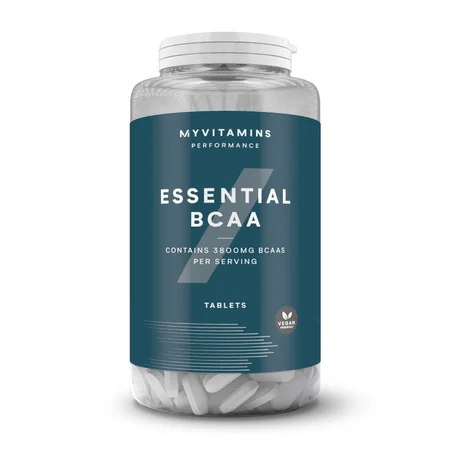When To Take BCAAs

With so many supplements on the market it can be hard to know what to take and when to maximise your results. BCAAs are often found in pre-workout supplements, but is that the only time to get their benefits? Read on to learn more about how to make BCAAs work best for you.
What are BCAAs?
BCAAs, or branched-chain amino acids, are a specific group of amino acids — the building blocks of protein. ‘Branched-chain’ refers to the special chemical structure of these three amino acids — which the body can’t make enough of on its own, making them part of the group of essential amino acids that we have to get from our diet.1 The names of the three BCAAs are leucine, isoleucine, and valine.

What are the benefits of BCAAs?
Muscle Building
Like most amino acids and protein supplements, the main reason to take BCAAs is to build muscle. When you challenge your muscles through exercise, it makes them break down — and we need to take in amino acids and protein in our diet to help them build back up. While the muscles are constantly going back and forth between breaking down (catabolism) and building up (anabolism), taking in extra amino acids that they need can make the difference to build lean mass.
Energy Boost
BCAAs are often taken prior to a workout because they are also known to help give you more energy. Research has shown that taking BCAAs can reduce the body’s perception of fatigue, making it possible to boost your performance and perform more reps or use heavier loads.2 Having more energy to complete more challenging workouts goes back to the muscle building benefit.
Reduce Soreness
Have you ever noticed that you feel incredibly sore well after your workout — up to 2 days later? This feeling is called delayed onset muscle soreness, or DOMS, which can happen after a tough workout. BCAAs have been shown to reduce DOMS, which means you feel less sore and are able to recover more quickly and get back to your workouts.3 Researchers think this is because the BCAAs are readily available and work more quickly to help with recovery.
When to take BCAAs?
So, what’s the best time to take BCAAs? There are 2 main times to take BCAAs to have the positive benefits listed above due to their varying benefits.
1. Before a workout
If you need the energy boost for your strength workout, it would be best to take them before your workout. You can mix with your pre-workout — if they aren’t already included — or on their own.
This is also a good time to take them to prevent too much muscle breakdown while your exercise — you might even want to drink a BCAA drink while you exercise, as they’re generally a juicy and refreshing option that can spice up your usual water.
You can also add them to your protein shake for an extra BCAA boost, or may find that some blends already have the optimum amount needed to get you feeling on top form.
2. After a workout
If you’re struggling with DOMS and want to improve your recovery (while building muscle), taking them after your workout can give you the greatest benefit.
You can simply mix with water and enjoy as a refreshing drink post-workout, or ensure you get them in as a part of your next meal from different protein sources.
BCAAs are found in both animal and plant sources of protein, but if you feel a meal is a little low on them, then supplementing with BCAAs can be a convenient alternative too.
Take Home Message
The three branched chain amino acids are a powerful trio that can really make an impact on your training. Whether you need some extra energy, are struggling with soreness, or just want to maximise your muscle building, using BCAAs as part of your training routine can be the extra boost you’re looking for.

Claire is a Registered Dietitian through the Academy of Nutrition and Dietetics and a board-certified Health and Wellness Coach through the International Consortium for Health and Wellness Coaching. She has a Bachelor of Science in Biology and a Master’s degree in Clinical Dietetics and Nutrition from the University of Pittsburgh.
Talking and writing about food and fitness is at the heart of Claire’s ethos as she loves to use her experience to help others meet their health and wellness goals.
Claire is also a certified indoor cycling instructor and loves the mental and physical boost she gets from regular runs and yoga classes. When she’s not keeping fit herself, she’s cheering on her hometown’s sports teams in Pittsburgh, or cooking for her family in the kitchen.
Find out more about Claire’s experience here.
1. Wolfe, R. R. (2017). Branched-chain amino acids and muscle protein synthesis in humans: myth or reality?. Journal of the International Society of Sports Nutrition, 14(1), 30.
2. Wiśnik, P., Chmura, J., Ziemba, A. W., Mikulski, T., & Nazar, K. (2011). The effect of branched chain amino acids on psychomotor performance during treadmill exercise of changing intensity simulating a soccer game. Applied physiology, nutrition, and metabolism, 36(6), 856-862.
3. Shimomura, Y., Inaguma, A., Watanabe, S., Yamamoto, Y., Muramatsu, Y., Bajotto, G., … & Mawatari, K. (2010). Branched-chain amino acid supplementation before squat exercise and delayed-onset muscle soreness. International journal of sport nutrition and exercise metabolism, 20(3), 236-244.






